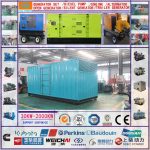Altitude testing is a crucial aspect of product development in various industries, including aerospace, automotive, and electronics. It involves subjecting products to conditions of high altitude to simulate the effects of operating in low-pressure environments. Diesel generators are commonly used to power altitude testing chambers due to their reliability, efficiency, and ability to operate in challenging environments. In this article, we will explore the advantages of using diesel generators for altitude testing and why they are the preferred choice for many testing facilities.
1. Reliability
One of the key advantages of using diesel generators for altitude testing is their reliability. Industrial Diesel Generator are known for their robust construction and durability, making them ideal for continuous operation over extended periods. When conducting altitude testing, it is essential to have a reliable power source that can withstand the demands of the testing process. Diesel generators are designed to provide consistent power output even under heavy loads, ensuring that the testing chamber maintains the required conditions throughout the test.
Furthermore, diesel generators are less prone to breakdowns and failures compared to other types of generators, making them a dependable choice for critical testing applications. The low maintenance requirements of diesel engines contribute to their reliability, as they can operate for long periods without the need for frequent servicing or repairs. This reliability is essential for altitude testing facilities that need to maintain precise testing conditions to ensure accurate results.
2. Efficiency
Another advantage of using diesel generators for altitude testing is their efficiency. Diesel engines are known for their high fuel efficiency, which translates to lower operating costs compared to other types of generators. The fuel consumption of diesel generators is typically lower than that of gasoline or natural gas generators, making them a cost-effective choice for powering altitude testing chambers.
In addition to their fuel efficiency, diesel generators are also known for their power output efficiency. Diesel engines can generate higher power outputs compared to other types of engines of similar size, making them an ideal choice for applications that require high power levels, such as altitude testing. The high power output of diesel generators ensures that the testing chamber receives an adequate supply of power to maintain the desired testing conditions.
3. Ability to Operate in Challenging Environments
Altitude testing often takes place in harsh environments, such as high-altitude locations or extreme temperature conditions. Diesel generators are well-suited for operating in challenging environments due to their rugged construction and ability to withstand extreme conditions. Diesel engines are designed to perform reliably in a wide range of temperatures and altitudes, making them a versatile choice for altitude testing applications.
Furthermore, diesel fuel is less prone to freezing compared to gasoline or natural gas, making diesel generators more suitable for cold weather conditions. This ability to operate in challenging environments makes diesel generators an excellent choice for altitude testing facilities located in remote or harsh environments where reliable power sources are essential.

4. Longevity
Diesel generators are known for their longevity and durability, making them a cost-effective investment for altitude testing facilities. Diesel engines are built to withstand the rigors of continuous operation and can last for many years with proper maintenance and care. The longevity of diesel generators reduces the need for frequent replacements or repairs, saving time and money for testing facilities in the long run.
Additionally, diesel engines are known for their high resale value, making them a valuable asset that retains its worth over time. When it comes time to upgrade or replace a diesel generator, testing facilities can recoup a significant portion of their initial investment by selling the generator to other businesses or organizations in need of a reliable power source.
5. Environmental Considerations
While diesel generators have traditionally been associated with higher emissions compared to other types of generators, recent advancements in diesel engine technology have made them more environmentally friendly. Modern diesel engines are designed to meet stringent emissions standards and are equipped with advanced emissions control systems to minimize their environmental impact.
Furthermore, diesel fuel is more energy-dense compared to other fuels, resulting in lower greenhouse gas emissions per unit of energy produced. This improved efficiency makes diesel generators a more environmentally sustainable choice for altitude testing applications, particularly in regions where air quality regulations are strict.
In conclusion, diesel generators offer a range of advantages for altitude testing applications, including reliability, efficiency, ability to operate in challenging environments, longevity, and environmental considerations. These benefits make diesel generators the preferred choice for powering altitude testing chambers in a wide range of industries. As technology continues to advance, diesel generators are likely to remain a key component of altitude testing facilities, providing the reliable power source needed to conduct accurate and precise testing.
